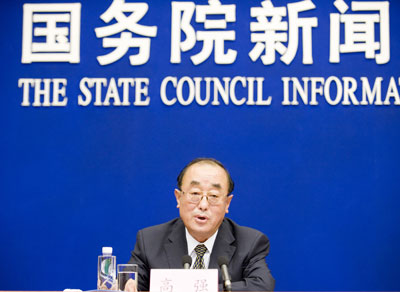North China's Hebei provincial government has ordered a halt of production of the Sanlu Group, the producer of the contaminated milk powder that initial investigation shows caused kidney stones of at least 432 babies.

Relevant authorities of the Central Government have ordered stopping sales of all Sanlu brand baby milk powder on the market and tightening checks on feedstuff, raw milk, and the processing, wholesale and sale links, said Gao Qiang, a senior Chinese health ministry official at a press conference on Saturday.
"It is a severe food safety accident," said Gao, referring to the baby milk powder contamination case involving the Sanlu Group.
A preliminary investigation has confirmed the baby milk powder contaminated by melamine was the cause of kidney stones in infants, said Gao, who is heading an emergency response group to deal with the Sanlu case.
Melamine is a raw chemical strictly forbidden by China to be used in food processing, he said, noting that the melamine substance found in some of the Sanlu products was deliberately added by lawless people to increase the protein percentage in raw milk or milk powder.
The health ministry has notified the World Health Organization, Hong Kong and Macao's health departments, the New Zealand Embassy in China and the press about the development, Gao said.
The State Council's Taiwan affairs office has also notified Taiwan's relevant department about the situation, urging the public to immediately stop consuming the Sanlu formula and seek medical assistance if they find babies who have drunk the formula have any trouble urinating.
According to Gao, Sanlu Group had got complaints about its baby milk powder in March and then confirmed the problems through an internal company investigation. It also took actions to recall some of these products. However, for a long time after that the group didn't report it to the government nor did it reveal the information to the public.
"Sanlu Group should take a large part of responsibility in the case," said Gao.
The country reported 432 sick babies suffering from kidney stones as of Friday,?he said.
The State Council, China's Cabinet, has decided to launch a nationwide checkup on all the country's baby milk powder producers and the results will be announced to the public, according to Gao.
"Substandard milk powder will be recalled and banned for sale," Gao said, citing the orders given by the Cabinet.
The State Council also pledged to give "free medical treatment" to the infant patients and urged the health departments to organize experts to fan out to remote rural areas to find out sick babies and send them into hospitals in time, the official said.
Gao promised an extensive quality probe into the products of all the 175 infant formulas produced throughout the country.
"The inspection will not only probe into the processing, but also trace back to the raw milk," he noted.
He also stressed that a few days would be needed because of the substantial workload. "We will present the inspection result as it is."
Gao said the Chinese government had adopted effective measures to address the food quality concerns over the past years and to strengthen the dairy product quality supervision. "Within a long period of time, the quality of China's dairy products was guaranteed."
The official called the accident a "reminder", which revealed the importance of ceaseless efforts that should be made to strengthen the effective food quality supervision.
The Ministry of Health, along with other ministries and the Hebei Provincial Government will make in-depth and serious investigation into the reasons and responsibilities of this food safety accident, according to Gao.
"For those people who proved to be responsible for the accident, they will be seriously dealt with," he added.
"We will sum up experiences and lessons learned from this accident and find loopholes in the country's food quality supervision."
Gao said they are now investigating how the melamine was added into the raw milk.
So far, a total of 19 people related have been detained.
The central government vowed to release relevant information in time, including the investigation result of the incident, the treatment of the infant patients and the quality of other brands of milk powder.
The contaminated Sanlu baby milk powder was only sold on the Chinese mainland and Taiwan. And "Only a fraction of the milk powder" was sold to Taiwan for food processing, said Gao.
(Xinhua News Agency September 13, 2008)